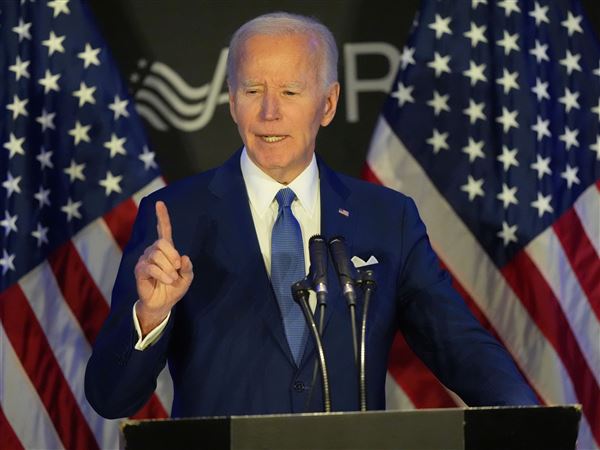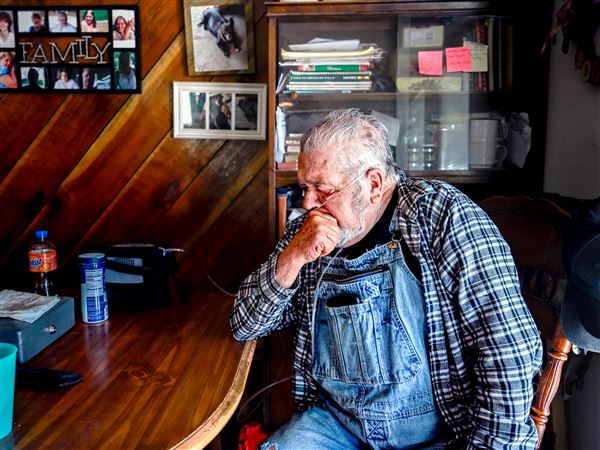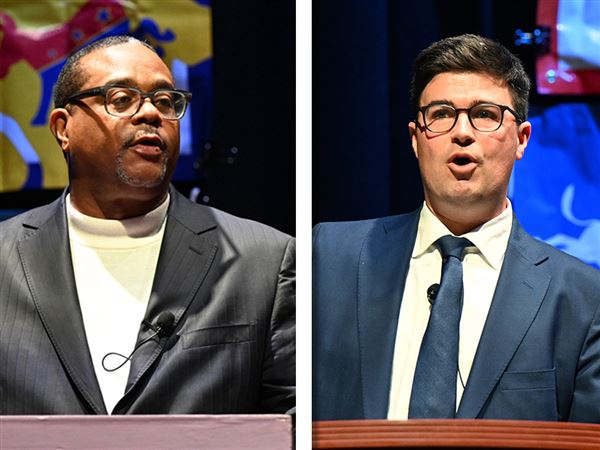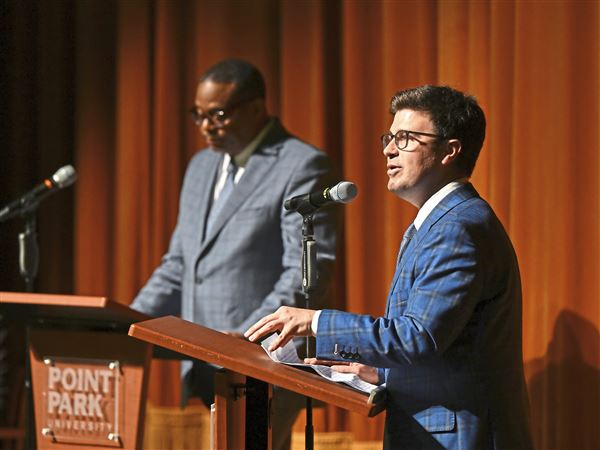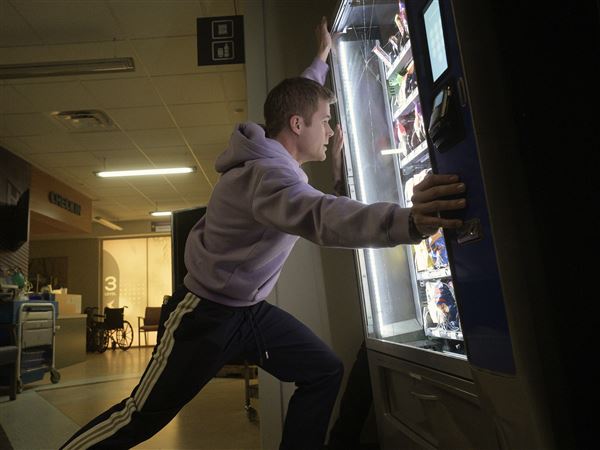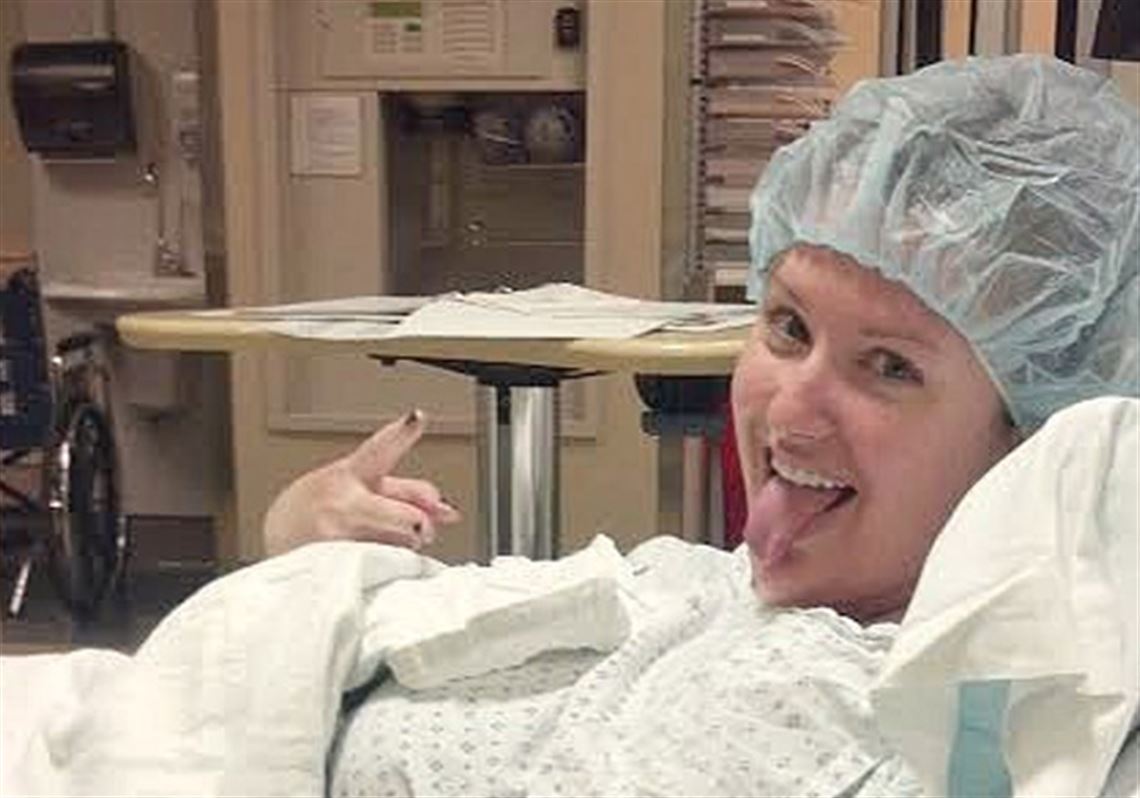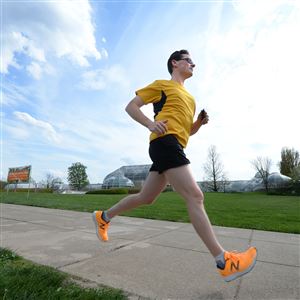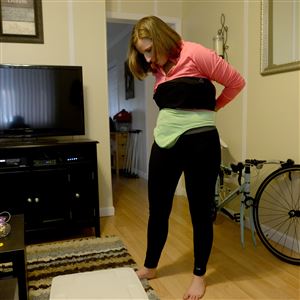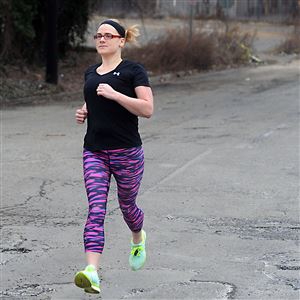2016 Pittsburgh Marathon relay team members Megan and Sarah Kellogg were like any other sisters while growing up in Pine — best friends one day and mortal enemies the next, especially when the inevitable case of sibling rivalry set in during high school.
“We definitely went in different directions,” says Megan, 33, of Ross, with a laugh, recalling how she played sports while her sister focused her energy on musical theater. “I’m the more laid-back, relaxed sister and Sarah is definitely more intense.”
Yet even when the girls bickered, their devotion to one another was unequivocal, perhaps because in the back of their minds they knew someone’s life depended on it.
Now 30 and working as a commercial credit analyst in Kentucky, Sarah was diagnosed at birth with polycystic kidney disease, a genetic disorder in which cysts grow in the kidneys, killing the healthy tissue. It eventually causes organ failure. As a sibling, Megan was likely to have an acceptable tissue match.
“It was just, ‘she has a kidney problem and one day I’ll give her one of mine,’ ” says Megan, director of Seven Fields KinderCare.
“We’d joke about it,” says Sarah, going so far as to dub the promised organ “Sydney.”
“One day” came when Sarah — increasingly tired, cranky and plagued by nausea — was 28. The dual operation took place at the University of Kentucky Medical Center. It was, Megan says, life-changing in more ways than one.
Filled with a new life and energy, “Her whole outlook on life changed,” says Megan. “Now, the sky’s the limit.”
That includes running road races like Sunday’s marathon relay, and determining which sister is going to get stuck with Leg 3 with its big hill into Oakland.
In signing up for the race with two other transplant recipients and a living donor — the marathon’s first relay team comprised of organ donors and recipients — the sisters hope to raise awareness of organ and tissue transplantation. They’ll also be raising money through Team Pittsburgh Transplant to help local athletes and donor families to attend the Transplant Games of America this summer in Cleveland. Modeled after the Olympics, the quadrennial competition allows transplant recipients and living donors to compete for gold, silver and bronze medals in individual and relay events.
What will make the race especially sweet, says Sarah, is that May 1 marks the two-year anniversary of their surgeries. Pinning on a bib, she notes, “is a pretty cool way to celebrate.”
Need for transplants
More than 123,000 Americans of all ages need lifesaving organ transplants, according to the U.S. Department of Health and Human Services. Twenty-two people die each day awaiting transplants.
Many believe only immediate family members can be donors, but that’s often not the case when it comes to kidneys. Blood and tissues types must be compatible but the donor does not need to be a relative. When this fist-sized organ is transplanted from a healthy living donor, the donor’s remaining kidney gets bigger to take over the work of two. Most donors recover in a matter of weeks — in the hospital just three days, Megan Kellogg was back to work in less than a month — and the kidney loss does not interfere with a woman’s ability to have a baby.
You don’t even have to know the person, as demonstrated by the relay team’s organizer, Lora Wilson of Plum, who in 2007 donated a kidney to a 71-year-old stranger in New Jersey. She’d live to be 80.
She gave the “non-directed” donation, she says, because she knew first-hand how profound an effect it would have on a person’s life. In 2000, her husband, Robb, with type 1 diabetes, received a kidney and pancreas transplant that kept him alive.
While the 56-year-old pondered becoming a living donor for years, it wasn’t until after her mother died that she decided to take action. “I was at a crossroads where you look at who you are,” she says. “The thought wouldn’t go away.”
Potential donors are extensively screened physically and mentally so doctors know they’re healthy and making an informed decision, but it can happen fairly quickly; Ms. Wilson transplanted within six months of her initial evaluation.
Like Sarah Kellogg, she recovered quickly after the operation at UPMC Montefiore and, inspired by the living donors she’d met at the Transplant Games in 2004 in Minneapolis and four years later in Pittsburgh, got involved. In 2010, when organizers expanded the competition to include living donors, she decided to complete in the 5K — despite the fact she’d never run before.
“I didn’t do very well, but I enjoyed it and decided to stick with it,” says Ms. Wilson, executive director of Pittsburgh Bone, Joint & Spine, a specialty orthopedic group in McKeesport, who in the 2012 games won a gold medal in her age group. She now does local races, as well, including last year’s Pittsburgh marathon relay.
In being athletic, she hopes to dispel the myth that living donors don’t do well afterward. The relay, she says, in a metaphor for organ donation. “You have to stand and wait [at your exchange zone] and can’t take a step forward until your teammate gets there,” she says. “None of these people can get their transplants unless there’s a center with qualified doctors and donors.”
Hope for the future
Organ recipients often do just as well as donors. Most renal patients bounce back fairly quickly, says Amit Tevar, UPMC surgical director of kidney and pancreas transplantation.
“People underestimate how debilitating dialysis can be,” says Dr. Tevar. “It’s exhausting and leaves patients wiped.” By getting a transplant, they move past the acute stage, and can resume full activities.
In fact, exercise is recommended after a kidney transplant to help ensure patients lead a healthy lifestyle and as a result, live longer.
Tracy Minnear of Cresson, Cambria County, who was diagnosed in 1989 with an autoimmune disease called IgA nephropathy, is another of the relay team’s success stories. Now 56, she received a transplant in 2001, after two years of dialysis.
Being hooked up to the filtering machine the first few months was devastating. “I cried every day when I was alone,” she says. “I wondered why am I still here when part of me has died?”
It was after a family Christmas party in 2000 during which she had a conversation with her husband’s Uncle Bill, a physician’s assistant, that her luck would change. Turns out his wife, Nancy, had been listening to them discuss the mechanics of kidney donation and decided she wanted to do it. The following July, Nancy donated a kidney to Mrs. Minnear. That act of generosity was, and still is, overwhelming.
“They’re the best part of my story,” she says. ”They’re definitely a couple who are very caring.”
Moderately active before her transplant, Mrs. Minnear caught the running bug in 2004, when she signed up for a 5K at the Transfer Games in Minnesota, and race-walked away with a bronze medal.
The relay will be her longest distance to date, as well as her largest race.
A new beginning
Laura Baker, who’s doing the first leg of the relay, underwent a heart transplant at UPMC in November 2014.
Now 41, she suffered a viral infection at age 20 that led to dilated cardiomyopathy, a disease where the heart muscle stretches and gets thinner and the heart can’t pump as well. She went into heart failure in 2013.
Because her options for a transplant were limited at home in West Henrietta, N.Y., she Googled her options elsewhere. UPMC ended up agreeing she was a good candidate. As she waited she had to have a mechanical pump implanted in her chest. Upon recovery four months later, she got the heart of a 35-year-old Pittsburgher who’d died.
A runner before her transplant, the mother of three recovered quickly enough that she ran a 5K about 6 months after the operation. Since then she’s done five more races, including Rochester’s Flower City Challenge half marathon this past Sunday.
While she takes longer to warm up than the average runner and must watch that her heart rate doesn’t climb too fast, she’s in as good as shape as everyone else on the relay team.
“It’s just a matter of listening to my body,” she says.
She jumped at the chance to do the relay in her adopted city of Pittsburgh because in her runner’s mind, a full marathon is the Holy Grail.
Her participation speaks to her perseverance, and the promise she made to her donor’s mother that she’d do everything she could to stay healthy and protect his heart.
“The only reason I’m able to run is because of the selfless decision of a family in their greatest time of need,” she says. “I’m doing something I love that would not have been possible without a donor.”
Gretchen McKay: gmckay@post-gazette.com, 412-263-1419 or on Twitter @gtmckay.
First Published: April 26, 2016, 4:00 a.m.
